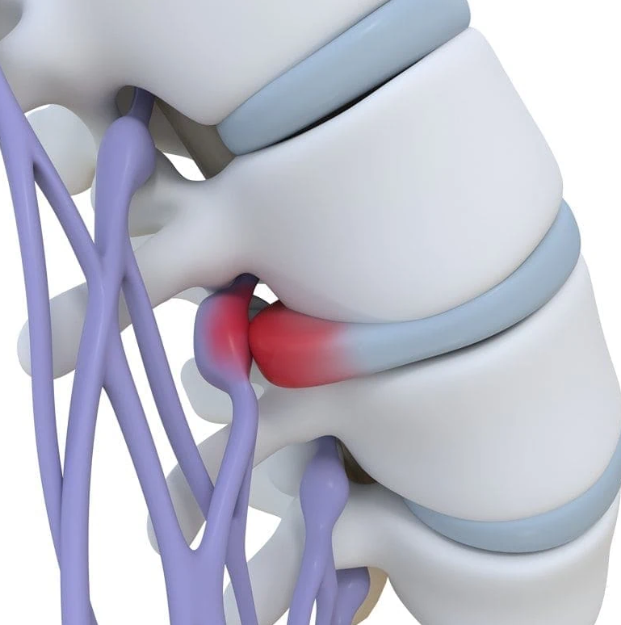
Understanding Disc Bulge: Causes, Symptoms, and Treatments
Share

A disc bulge, commonly referred to as a bulging disc, occurs when the intervertebral disc, a cushion-like structure situated between the bones of the spine, protrudes beyond its usual boundary. This condition is often the result of aging, repetitive strain, or injury, leading to the outer layer of the disc weakening or degenerating. Unlike a herniated disc, where the inner gel-like core pushes out through a tear in the outer layer, a bulging disc remains intact but extends outward, potentially compressing nearby nerves. This compression can cause symptoms such as localized pain, radiating discomfort, numbness, tingling, and muscle weakness, affecting daily activities like walking, bending, lifting, and even sitting or standing for prolonged periods.
Effects on Daily Activities
-
Pain and Discomfort: A bulging disc can cause significant pain and discomfort, especially if it presses on nearby nerves. This pain can be localized to the back or neck or radiate to other parts of the body, such as the arms or legs.
-
Reduced Mobility: Pain and stiffness from a bulging disc can limit your range of motion, making it difficult to perform everyday tasks like bending, lifting, or even walking.
-
Numbness and Tingling: If the bulging disc compresses a nerve, it can lead to numbness, tingling, or a "pins and needles" sensation in the affected area. This is commonly felt in the limbs.
-
Weakness: Nerve compression can also cause muscle weakness, making it challenging to carry out activities that require strength and coordination.
-
Difficulty Sitting or Standing: Prolonged sitting or standing may exacerbate pain, making it hard to maintain these positions for extended periods.
-
Impact on Sleep: Pain and discomfort can interfere with your ability to find a comfortable sleeping position, leading to disrupted sleep and fatigue.
-
Daily Tasks: Simple tasks like getting dressed, cooking, or even driving can become more difficult and painful.
Causes of a Bulging Disc
A bulging disc, also known as a herniated disc, can be caused by various factors as outlined in the search results:-
Sedentary Lifestyle and Smoking: Leading a sedentary lifestyle or smoking can increase the chances of a bulging disc. Continuous strain on the disc from injury, heavy lifting, and strain can wear them down over time

- Weakened Back Muscles: Weak back muscles can accelerate the process of disc degeneration and may lead to a sudden herniation of the weakened disc
- Bad Posture: Improper body positioning during activities like sleep, sitting, standing, or exercise can contribute to the development of a bulging disc.

- Obesity: Excess body weight puts extra stress on the spine and discs, making them more susceptible to herniation
-
High-Impact Activities: Engaging in high-contact sports or activities that place stress and strain on the spine can weaken the discs.

- Improper Footwear: Runners who fail to use shoes providing orthopedic support may develop bulging discs
-
Aging Process and Disc Degeneration: Natural aging process combined with disc degeneration is a common cause of bulging discs.

- Repetitive Movements and Poor Posture: Repetitive movements, strenuous lifting, twisting of the body, poor posture, and bone spurs pushing against the disc can contribute to a bulging disc.
Management and Treatment
- Rest and Activity Modification: Avoiding activities that exacerbate the pain and incorporating periods of rest can help manage symptoms.
- Physical Therapy: Exercises and stretches can strengthen the muscles around the spine, improving support and reducing pressure on the disc.
- Supplements : Supplements can be a natural way of treating disc bulge. There are various ingredients which helps in managing pain and inflammation.
- Medication: Over-the-counter pain relievers, anti-inflammatory drugs, or prescribed medications can help manage pain and inflammation.
- Heat/Ice Therapy: Applying heat or ice to the affected area can provide relief.
- Lifestyle Changes: Maintaining a healthy weight, practicing good posture, and using ergonomic furniture can help prevent further strain on the spine.
- Injections: In some cases, corticosteroid injections may be recommended to reduce inflammation and pain.
- Surgery: If conservative treatments are not effective and the pain significantly impacts daily life, surgical options may be considered.
It's important to consult with a healthcare professional for a proper diagnosis and personalized treatment plan if you suspect you have a bulging disc.
Conclusion
A disc bulge, commonly referred to as a bulging disc, occurs when the intervertebral disc, a cushion-like structure situated between the bones of the spine, protrudes beyond its usual boundary. This condition is often the result of aging, repetitive strain, or injury, leading to the outer layer of the disc weakening or degenerating. Unlike a herniated disc, where the inner gel-like core pushes out through a tear in the outer layer, a bulging disc remains intact but extends outward, potentially compressing nearby nerves. This compression can cause symptoms such as localized pain, radiating discomfort, numbness, tingling, and muscle weakness, affecting daily activities like walking, bending, lifting, and even sitting or standing for prolonged periods. Effective management may include a combination of rest, physical therapy, medication, lifestyle adjustments, and in severe cases, surgical intervention, aiming to alleviate pain and restore normal function.
